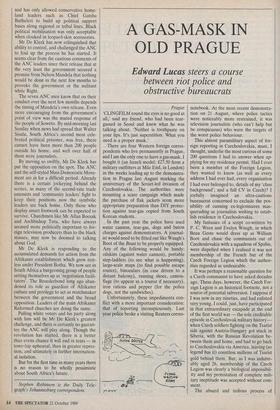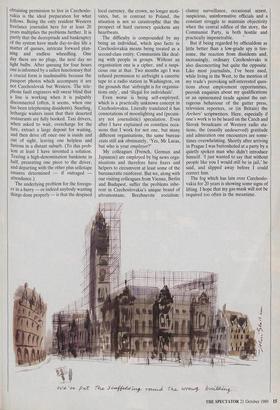A GAS-MASK IN OLD PRAGUE
between riot police and obstructive bureaucrats
Prague `CLINGFILM round the eyes is no good at all,' said my friend, who had been tear- gassed in Seoul and knew what he was talking about. 'Neither is toothpaste on your lips. It's just superstition. What you need is a proper mask.'
There are four Western foreign corres- pondents who live permanently in Prague, and I am the only one to have a gas-mask. I bought it (an Israeli model: £27.50 from a military outfitters at Mile End, in Londoh) in the weeks leading up to the demonstra- tion in Prague last August marking the anniversary of the Soviet-led invasion of Czechoslovakia. The authorities were mounting a scare campaign which made the purchase of flak jackets seem more appropriate preparation than DIY protec- tion against tear-gas copied from South Korean students.
In the past year the police have used water cannon, tear-gas, dogs and baton charges against demonstrators. A journal- ist would need to be fitted out like Waugh's Boot of the Beast to be properly equipped. Any of the following would be handy: oilskins (against water cannon), portable step-ladders (to see what is happening), large-scale maps (to find possible escape routes), binoculars (in case driven to a distant balcony), running shoes, camou- flage (to appear as a tourist if necessary), iron rations and pepper (for the police dogs, not the sandwiches).
Unfortunately, these impedimenta con- flict with a more important consideration: that of reporting inconspicuously. Last year police broke a visiting Reuters corms- notebook. At the most recent demonstra- tion on 21 August, where police tactics were noticeably more restrained, it was television journalists (who can't help but be conspicuous) who were the targets of the worst police behaviour.
This almost paramilitary aspect of for- eign reporting in Czechoslovakia, must, I thought, underlie the most curious of some 200 questions I had to answer when ap- plying for my residence permit. Had I ever been a member of the Foreign Legion, they wanted to know (as well as every address I had ever had, every organisation I had ever belonged to, details of my 'class background', and a full CV in Czech)? I joyfully imagined an ultra-cautious bureaucrat concerned to exclude the pos- sibility of cunning ex-legionnaires mas- querading as journalists wishing to estab- lish residence in Czechoslovakia.
My fantasies of a script co-written by P. C. Wren and Evelyn Waugh, in which Beau Geste would dress up as William Boot and chase the communists out of Czechoslovakia with a squadron of Spahis, were dispelled when I realised it was not membership of the French but of the Czech Foreign Legion which the author- ities regarded as undesirable.
It was perhaps a reasonable question for a Czech communist to have asked decades ago. These days, however, the Czech For- eign Legion is an historical footnote, not a source of potential subversion. I suppose if I was now in my nineties, and had enlisted very young, I could, just, have participated in that extraordinary escapade at the end of the first world war — the sole creditable episode in Czechoslovak military history when Czech soldiers fighting on the Tsarist side against Austria-Hungary got stuck in Siberia, with the Russian Revolution be- tween them and home, and had to go back to Czechoslovakia via America, leaving (so legend has it) countless millions of Tsarist gold behind them. But, as I was indubit- ably aged 26, membership of the Czech Legion was clearly a biological impossibil- ity and my protestation of complete mili- tary ineptitude was accepted without com- ment.
The absurd and tedious process of obtaining permission to live in Czechoslo- vakia is the ideal preparation for what follows. Being the only resident Western freelance journalist here for at least 20 years multiplies the problems further. It is partly that the decrepitude and bankruptcy of the system have made day-to-day life a matter of queues, intricate forward plan- ning and endless wheedling. One day there are no plugs, the next day no light bulbs. After queuing for four hours one is informed by a sullen functionary that a crucial form is inadmissible because the passport photos which accompany it are not Czechoslovak but Western. The tele- phone fault engineers will swear blind that a line is working when it is palpably disconnected (often, it seems, when one has been telephoning dissidents). Snarling, lethargic waiters insist that their deserted restaurants are fully booked. Taxi drivers, when asked to wait, overcharge for the fare, extract a large deposit for waiting, and then drive off once one is inside and out of sight, leaving one helpless and furious in a distant suburb. (To this prob- lem at least I have invented a solution. Tearing a high-denomination banknote in half, presenting one piece to the driver, and departing with the other plus sellotape ensures determined — if outraged attendance.)
The underlying problem for the foreign- er in a hurry — or indeed anybody wanting things done properly — is that the despised local currency, the crown, no longer moti- vates, but, in contrast to Poland, the situation is not so catastrophic that the prospect of hard currency quickens any heartbeats.
The difficulty is compounded by my being an individual, which ipso facto in Czechoslovakia means being treated as a second-class entity. Communists like deal- ing with people in groups. Without an organisation one is a cipher, and a suspi- cious one at that. Two months ago I was refused permission to airfreight a cassette tape to a radio station in Washington, on the grounds that `airfreight is for organisa- tions only', and 'illegal for individuals'.
Even worse is being self-employed, which is a practically unknown concept in Czechoslovakia. Literally translated it has connotations of moonlighting and (pecuni- ary not journalistic) speculation. Even after I have explained on countless occa- sions that I work for not one, but many different organisations, the same bureau- crats still ask obstinately, 'Yes, Mr Lucas, but who is your employer?'
My colleagues (French, German and Japanese) are employed by big news orga- nisations and therefore have fixers and helpers to circumvent at least some of the bureaucratic rainforest. But we, along with our visiting colleagues from Vienna, Berlin and Budapest, suffer the problems inhe- rent in Czechoslovakia's unique brand of ultramontane, Brezhnevite socialism:
clumsy surveillance, occasional arrest, suspicious, uninformative officials, and a constant struggle to maintain objectivity when the central edifice of the story, the Communist Party, is both hostile and practically impenetrable.
But if being regarded by officialdom as little better than a low-grade spy is tire- some, the reaction from dissidents and, increasingly, ordinary Czechoslovaks is also disconcerting but quite the opposite. Like most journalists, I've been used, while living in the West, to the mention of my trade's provoking self-interested ques- tions about employment opportunities, peevish enquiries about my qualifications or an opinionated tirade against the out- rageous behaviour of the gutter press, television reporters, or (in Britain) the Archers' scriptwriters. Here, especially if one's work is to be heard on the Czech and Slovak broadcasts of Western radio sta- tions, the (usually undeserved) gratitude and admiration one encounters are some- times overwhelming. Shortly after arriving in Prague I was buttonholed at a party by a quietly spoken man who didn't introduce himself. 'I just wanted to say that without people like you I would still be in jail,' he said, and slipped away before I could correct him.
The fog which has lain over Czechoslo- vakia for 20 years is showing some signs of lifting. I hope that my gas-mask will not be required too often in the meantime.



























































 Previous page
Previous page